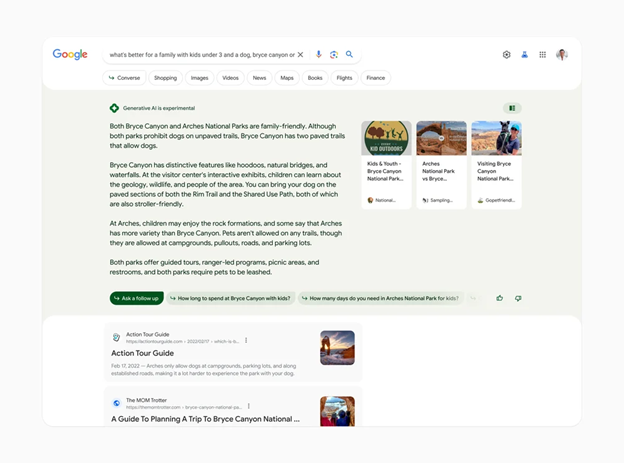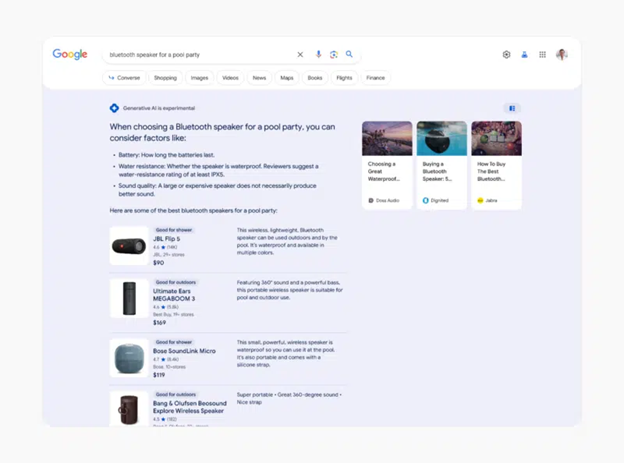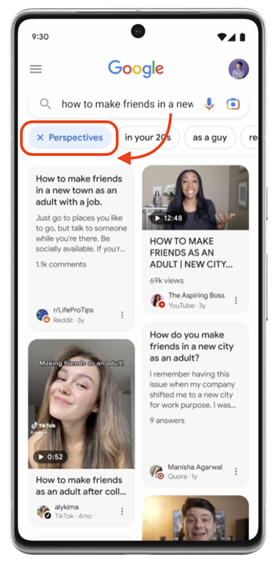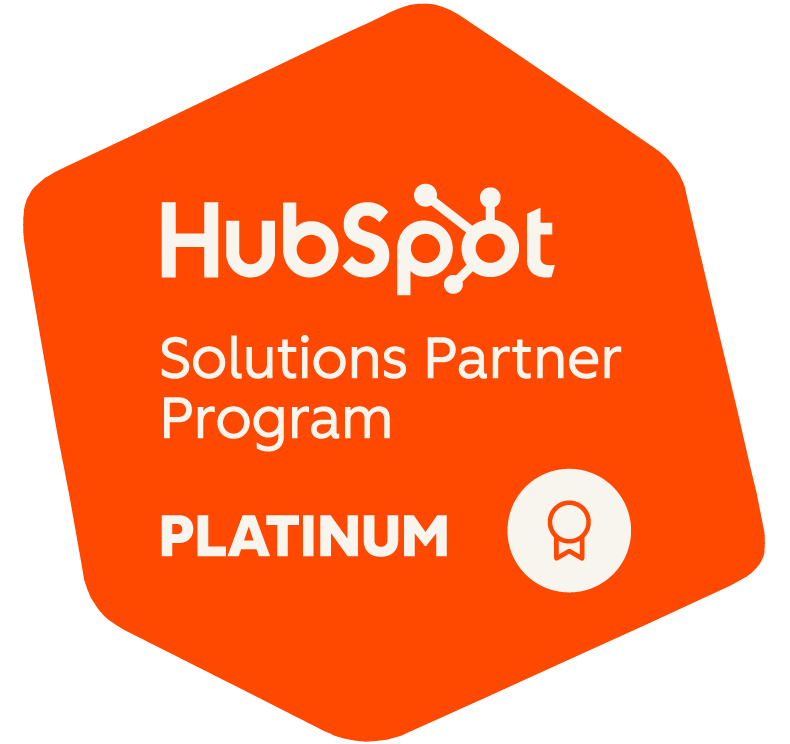There’s a lot that can be said about artificial intelligence (AI), and more specifically about the latest in conversational AI and generative AI that is being used by Google and Bing in search using these large language models (LLMs). You’ll know them as Bing GPT-4 by OpenAI and Google Bard—AI-powered chatbots generating search results.
In case you need a quick recap of what has been happening with OpenAI’s GPT-4 and Google’s AI chatbot Bard in the past few months, here are some helpful resources to explore:
For the sake of this article, we want to focus on the very latest Google had to say when it comes to new features they’re bringing to search, using Bard, and how you may want to pivot your marketing strategy to prepare.
What New Features Are Coming to Search?
At the Google I/O 2023 Keynote last week, Google announced a number of AI features and advancements coming from their new AI technology that will be added to search in the coming weeks: Search Generative Experience (SGE) and Perspectives.
We don’t yet know the exact launch date of these new features from machine learning, but below is some relevant information to know about each one.
Search Generative Experience (SGE)
 Source: Google
Source: Google
Search Generative Experience (SGE) expands upon Google’s use of Featured Snippets to answer users’ queries with generative AI that can respond to more detailed search questions and allow for follow-up questions to expound upon each query that came before it.
With SGE, Google will cite specific websites from which the query response was pulled and provide an option for users to “Google It” if they want to see more.
Another feature of SGE is product queries:
 Source: Search Engine Land
Source: Search Engine Land
When users search for a specific product to meet a specific need, Google will use its Shopping Graph to pull in the results in this new, enhanced snippet.
This will be important to consider for your product page optimizations.
Perspectives
 Source: Search Engine Journal
Source: Search Engine Journal
With Google’s new Perspectives feature in search, users will be able to search for specific perspectives from people on a given topic: for instance, someone in their 20s, as a guy, etc. Google has not provided a full list of their Perspectives filter just yet.
One of the applicable takeaways from this new feature is the need for better audience targeting and enhancing quality review content. It will be interesting to see more on this moving forward.
To learn more about each new search feature, listen to the full Google Keynote or read through these top takeaways.
How Should You Pivot Your Marketing Strategy to Prepare for This Google AI Chatbot Update?
While it doesn’t seem like a lot of change to Google search, the implications of these changes are huge. To help you prepare for what’s to come, here are some ways we believe you should pivot your marketing strategy so your business is set up for success.
Understand your audience.
Audience has always been an important component for marketing, but even more so with how competitive industries are becoming online and the changes Google continues to make to its algorithm and search results.
With “Perspectives,” users will be able to filter for age, gender, interest, and maybe more as they search for content on the web. That means, Google is going to give them content that matches their demographics.
Now, Google was likely already doing a lot of this behind-the-scenes, but it is now bringing it to the forefront so users can choose what they want to see and from whom they want to see it.
If you haven’t been targeting your specific audiences with your content, now is the time.
Tip: Consider pillar pages and categories for your content geared to specific personas, if you have several for your business, so Google can easily sort through your website content to see what material is most relevant to your target audience.
Apply E-E-A-T to all of your writing.
As a reminder, E-E-A-T was an update Google made to their Quality Rater Guidelines last year. It stands for Experience, Expertise, Authoritativeness, and Trust. Google uses this as they consider what content is most relevant and helpful to searcher’s queries and what content they want to present to them.
What does this mean for your content?
With everything you write, you want to do so in a way that demonstrates your Experience, Expertise, Authoritativeness, and builds Trust.
We encourage our clients to provide us insights into their expertise and given experience on a topic, whether that means having them write content and we optimize it or simply using them to edit and proof the content we write to ensure the content provides accuracy, value, and authority on a given topic.
Your expertise and experience matter. Users care about it, especially at a time when it’s hard to know what to trust, which means Google does, too.
Tip: Add author bylines to your articles of people at your company who can provide authority, expertise, and experience to what is written for your users. And remember to cite your sources to help build trust and credibility among your readers.
Focus on the long-long-long-long-unlimited-tail-keywords.
With Google’s new search features, users can start with a question and build off that initial search as they have follow-up questions to ask on a given topic.
What will this mean for content writers and businesses?
When you think of a topic to write, consider ALL of the potential questions that surround that topic and then answer them.
This could mean creating a long-form piece of content or guide that answers each of these questions, OR you could create pillar pages or category pages around these specific topics with links to individual articles that answer those questions. As Bard is searching for resources in response to these questions, yours will become an easy source to pull.
Tip: Create content calendars and strategies with user questions and queries in mind. What questions do they have on a given topic? How can you help answer all of those questions on your site?
Be wary of relying on AI to write everything for you.
Do you know why Google releases multiple algorithm updates each year? They want to improve user experience on search, and that means providing quality content.
Now, don’t get me wrong. Using AI to help with writing can come in handy, but think about it like this… If everyone starts using AI to write content for them, the content on the web is going to become even thinner than it is now.
As a result, I believe users will become dissatisfied with search responses for a number of reasons:
- They’re going to see the same answer and type of content over and over again that aren’t really answering their questions.
- We are becoming more and more distrusting of what we read online. Users want multiple resources to back up claims and know that the writer has the experience, expertise, authority, and trustworthiness (E-E-A-T) to answer the question honestly.
So, what will happen when users start to get dissatisfied with the same-old answer and responses they don’t know they can trust? I’m guessing there will be some algorithm updates or regulations in the future that will come into play.
Can Google detect AI content? Some of it, yes. Google has already said they are going to start watermarking images and adding metadata to AI-generated content created with their tools that they will disclose to users. While they can’t regulate everything, it seems like it will only be a matter of time before regulations are created on AI-generated content.
“As part of Google’s promise to develop AI ethically, the company’s chief executive, Sundar Pichai, said all of Google’s AI models would include the use of watermarking and metadata to allow people to know that AI-generated content is exactly that.” – The Guardian
Tip: Use AI tools to help you create outlines or summaries you can use on a given topic, but don’t use it to create pieces of content for you. Users still want content that abides by E-E-A-T and they want content that is unique and helpful to them.
Prioritize a Certain Type of Content: Branding, Products, Opinions
As you write content, there are three areas we recommend focusing on the most:
Branding
When Google first released Featured Snippets in the fall of 2014, I remember Rand Fishkin saying, “The only thing Google can never take away from you is branded searches.”
Anytime Google makes changes to their Featured Snippets where they are answering more of the question and users aren’t clicking through to websites as often, SEOs and business owners get worried.
As you consider what content will be the most successful at reaching your target audiences, don’t forget about your brand.
When a user is searching for your brand, they want to hear from your brand. Write content about your brand and on behalf of your brand.
Products
Highlight your products and services in your content and make sure each of your products is optimized for search. Product optimization will help Google more easily pull in these listings for a more personalized search environment. You can do this using SEO and by creating quality content for your product pages.
Furthermore, with Google’s new Perspectives feature, quality, first-hand product reviews are going to become more important. As you look to promote your products, consider how you can get more users reviewing your products online.
Opinions
Users sometimes search deep, meaningful questions that don’t have a straightforward answer. When that’s the case, they want to know more on the topic, which will probably mean Google’s quick answer at the top of the page—even though it’s getting longer and they can ask follow-up questions—isn’t going to fully answer their question. They want sources to back up everything and hear a thorough argument on the topic.
While AI can make something up, subjective questions are harder for AI to answer to the satisfaction of users.
Prioritize a Holistic Marketing Strategy
Google has made a lot of changes over the years that haven’t exactly been in a business’s best interest when it comes to SEO.
That’s why marketers have started turning to a more holistic marketing approach, and this is increasingly becoming more important.
A holistic marketing approach uses multiple channels to market your business: search engine optimization, paid advertising, Amazon advertising, content marketing, social media marketing, email marketing, and making creative assets to support each effort. By utilizing all of these channels, your marketing team can work together to reach customers with your products and services no matter what changes each channel may make.
At Logical Media Group, we use data from our marketing efforts across channels to communicate internally with one another about how we can target our clients’ audiences more effectively and improve upon our marketing efforts for their business.
You don’t have to be afraid of what Google’s AI will do to search—understanding the changes is the first step to building a solid marketing strategy for your business that is built for the future. Here at Logical, we’re not afraid of AI; we’re actually excited for it!








